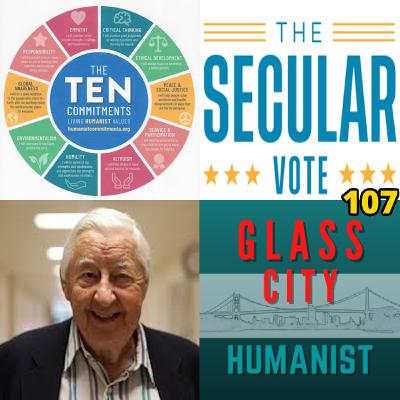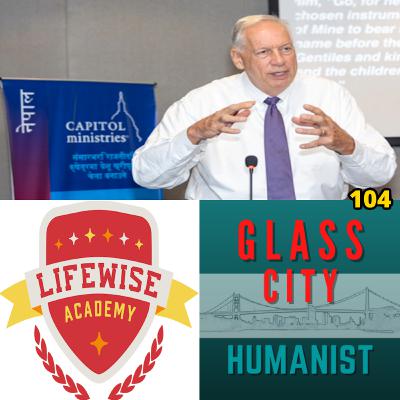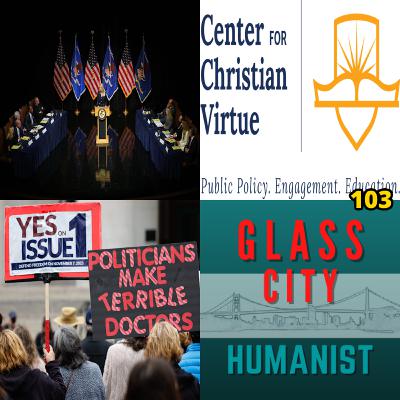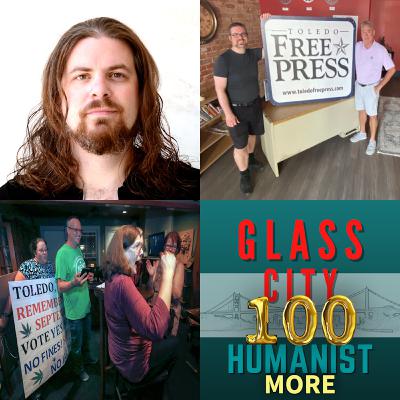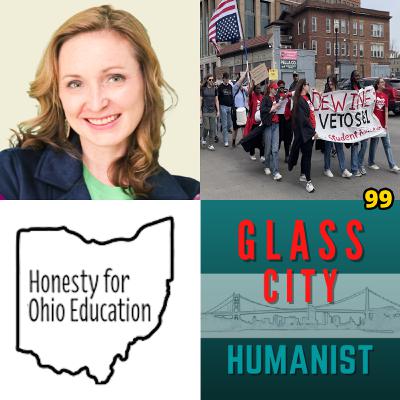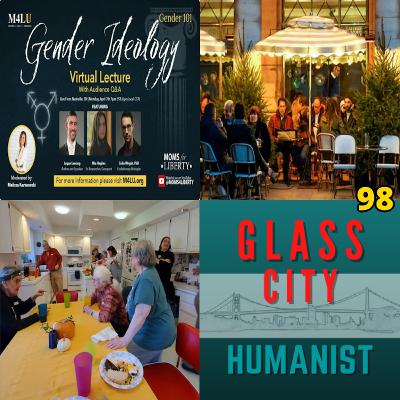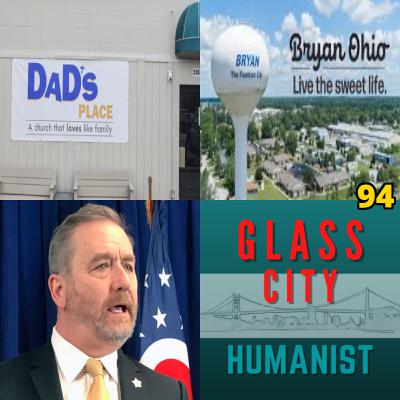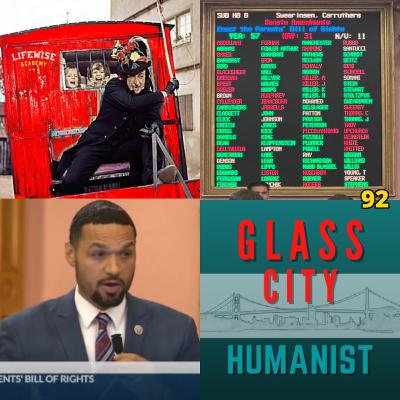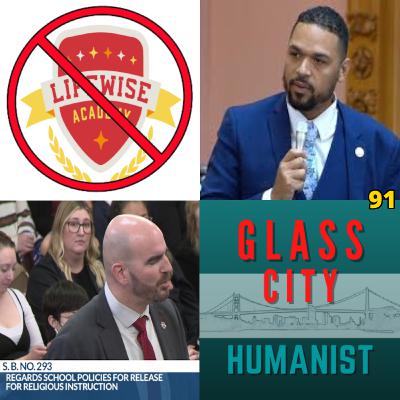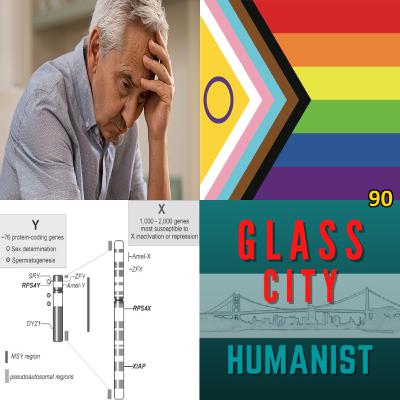Discover Glass City Humanist
Glass City Humanist

Glass City Humanist
Author: Douglas Berger
Subscribed: 14Played: 164Subscribe
Share
© Douglas Berger
Description
Explaining Humanist values, how we can live our values to support social justice issues, and responding to science denying Christian Nationalists bent on smashing the wall between church and state. Human problems require human solutions. There will be interviews, from time to time, with Humanists and other secular people in Northwest Ohio and beyond.
109 Episodes
Reverse
We're joined by Jake Via, the new Organizing Director for the American Humanist Association. Our conversation explores Jake's journey from his conservative Christian upbringing to his eventual embrace of humanism. We look at how his early experiences shaped his values and laid the foundation for his current work, highlighting themes of community engagement and ethical living.Jake shares his thoughts on the role of an organizer at the AHA, explaining how grassroots mobilization and collaborative training efforts play a crucial part in advancing humanist values across the country. He points out the need for diverse programming that connects with a broader audience, recognizing that not everyone is drawn to traditional group formats. Jake expresses excitement for the initiatives he’s leading, including the recently launched Humanist Creator Fund aimed at sponsoring secular content creators. The project shows a smart way to expand humanism's reach and appeal, especially among younger generations who may not identify with traditional labels or organizations.Jake shares ideas about various outreach strategies, including programs for LGBTQ young humanists and the need for flexibility in how people can participate. He stresses that creating a welcoming environment is key for newcomers who might otherwise feel disconnected from formal humanist movements. Jake’s insights provide a clear path for building collaborative, supportive spaces that connect with individuals from many different backgrounds and experiences.Full show notes & links usedSubscribe to our free newsletterCheck out our merch
Recognizing the finite nature of human existence, humanists are inspired to maximize their time and consider the lasting legacies they will leave behind. This reflection was particularly meaningful due to the recent passing of our friend, Ford B Cauffiel Sr., an accomplished entrepreneur and community leader. Ford profoundly impacted those around him through his diverse contributions, including a notable classic car collection and philanthropic efforts supporting various charities and environmental causes.The discussion also touches upon the societal tendency to honor historical figures who may have had problematic aspects. The removal of the Christopher Columbus statue in Columbus, Ohio, was presented as a contemporary example of a cultural reevaluation where confronting uncomfortable historical truths is necessary. We advocated for a more thoughtful approach to commemoration, emphasizing the celebration of individuals who have genuinely worked towards the betterment of humanity, moving beyond glorified historical interpretations to embrace those whose actions align with humanistic values. The launch of the Secular Vote Project was also discussed, an initiative designed to empower the growing demographic of secular individuals in America. Led by figures such as Sarah Levin and Dr. Juhem Navarro-Rivera, this project aims to provide a focused voice for the often-overlooked non-religious population in political discourse, fostering a deeper understanding of secularism through research and discourse led by those who embody this identity.Full show notes and links usedSubscribe to our free newsletterCheck out our merch
We have a critical examination of the hypocrisy within the Christian nationalist movement, particularly concerning the lack of response to revelations from the Epstein files. We highlight the dissonance between the public pronouncements of moral leadership and arguing that partisan interests often supersede ethical accountability. Specific examples of political figures leveraging family values rhetoric while ignoring or downplaying serious moral crises are analyzed, exposing the devastating consequences of such double standards.We then explore the complex web of connections between Jeffrey Epstein and politically influential figures, particularly within the Republican Party. The episode analyzes the implications of past associations and the ongoing debate surrounding the release of Epstein's investigative files, underscoring the need for accountability and transparency. The discussion acknowledges the moral complexities inherent in this situation, advocating for a reckoning that prioritizes the rights and well-being of victims over the protection of powerful individuals. The narrative highlights the power dynamics that shield perpetrators and the urgent need to challenge these systems.If you wear your religion on your sleeve then We demand moral integrity from political leaders, particularly those who claim to champion family values and child protection.We also promote a Toledo screening of "The Last Class," a documentary featuring Robert Reich, focusing on education and economic justice. Proceeds from ticket sales will benefit our local humanist community.Full show notes & links usedSubscribe to our free newsletterCheck out our merch
We address a recent editorial from the Toledo Blade that mischaracterizes the failed merger between Kroger and Albertsons. Contrary to the editorial’s claims, it was not the Federal Trade Commission (FTC) but a federal judge who blocked the merger due to concerns about market competition. We discuss the broader implications of allowing massive grocery chains to consolidate, particularly the potential harms to consumer choice, pricing, and local economies.Then we look at a developing legal case involving LifeWise Academy, a religious group seeking to conduct Christian education for public school kids during the school day. Their lawsuit against the Ohio Civil Rights Commission centers on the ministerial exemption, a legal doctrine that exempts religious institutions from certain employment laws. We explore how this exemption, while designed to protect religious freedom, it should only apply to groups that actually preach a religion or are incorporated as religious. Lifewise is not that at all.Our main topic concerns the Johnson Amendment, a pivotal law that prevents tax-exempt organizations—including churches—from engaging in political endorsements. A recent court filing proves what church and state advocates have been saying for decades about the non-enforcement of the Johnson Amendment. We discuss the history and intent of the Johnson Amendment, its role in preserving the neutrality of religious institutions in politics, and the risks of increased religious influence on electoral processes if this safeguard is finally officially thrown away.Rounding out the episode, we invite listeners to reflect on broader humanist themes through the lens of two influential thinkers. We discuss Robert Reich’s advocacy for economic justice, framed by his new documentary The Last Class, which will be screening soon in Toledo. His insights on inequality and education resonate with humanist values of fairness and dignity. We also share actor and Humanist Stephen Fry’s contemplations on mortality and the search for meaning—an uplifting reminder of the importance of living authentically and compassionately, even in uncertain times.01:00 The Last Class Toledo Showing invite and promo07:54 Update on Lifewise lawsuit11:13 Correcting Toledo Blade Editorial about failed merger19:36 A Bit of Stephen Fry25:17 The Johnson Amendment Is Officially DeadFull show notes & Links usedSubscribe to our free newsletterCheck out our Merch
A recent ruling from Franklin County has called into question the constitutionality of the Ohio EdChoice voucher program, which has long been a point of debate for its impact on public school funding. The detailed 47-page decision found that the program violates the Ohio Constitution by diverting public funds away from public schools and into private institutions, effectively creating a dual education system. This thoughtful ruling not only invites a renewed conversation about the state’s funding priorities but also sets the stage for a meaningful legal review, as proponents of the voucher system prepare to appeal. It's a critical opportunity to reflect on how we invest in education and ensure equitable access for all students.We turn our attention to a story involving LifeWise Academy, an organization promoting Bible-based educational programs in the middle of the public school day. Recently, LifeWise faced allegations of labor law violations and responded by attempting to invoke a ministerial exemption—a legal concept usually reserved for recognized religious institutions. This case raises important questions about the balance between religious freedom and employee rights, and the responsibilities organizations must uphold when operating in public education spaces. By examining these legal nuances, we can better understand the boundaries of religious exemptions and how they intersect with employment protections. It’s a chance to think critically about maintaining fairness and accountability in all institutions, regardless of their religious affiliation.Finally, we look at the broader discussions about the role of government in supporting those in need, particularly in light of views expressed by Pastor Ralph Drollinger, who leads Bible studies for members of Congress. Drollinger advocates a model where aid to the poor is first the responsibility of individuals and families, rather than the state. While this perspective emphasizes personal and community involvement, it raises important concerns about whether such a framework is sufficient to address systemic poverty. We explore the history and importance of public social safety nets and argue for their continued necessity alongside private and charitable efforts. By drawing on historical and ethical perspectives, we make the case for policies that reflect compassion, equity, and collective responsibility—ensuring that no one is left behind.01:00 News Update11:07 Update of the News Update17:21 Systemic Poverty Needs Systemic Solutions: A Response to Religious ConservativesFull Show Notes & Links UsedSubscribe to our free newsletterCheck out our merchSupport the show
We look into the implications of the inaugural meeting of President Trump's Religious Liberty Commission. The makeup of this commission suggests that true religious liberty may not be its primary focus, but rather an agenda of promoting Christian nationalism. The commission is chaired by Texas Lieutenant Governor Dan Patrick, with key figures such as Dr. Ben Carson and Paula White lending their voices to a narrative that prioritizes the rights and beliefs of Christians while sidelining the concerns of non-Christian and non-religious individuals.The commission features predominantly Christian members, alongside just one rabbi, with no representatives from other faiths or from the growing population of secular Americans. Then there is the absurdity of including controversial figures like television personality Dr. Phil, while critically assessing the narratives promoted by other commission members. Their rhetoric suggests a belief that religious ideologies must permeate all aspects of public life, framing the absence of Christianity in education as a significant societal threat. This perspective raises alarm bells about the direction in which they seek to steer the American landscape.Then we discuss the proposed Ohio state budget that has been hailed by a Christian nationalist group as pro-life and pro-family, despite its evident cuts to vital community services, including education and social support programs. Drawing on an insightful piece from columnist Marilou Johanek, we unpack how this budget undermines the very families it claims to protect, while simultaneously prioritizing religious agendas over critical humanitarian needs. This connects these issues to broader national narratives, such as the recent Supreme Court ruling on Tennessee's gender-affirming care ban, highlighting the discriminatory nature of these laws and the religious motivations behind them.Full show notes and links usedSubscribe to our free newsletterCheck out our merch
We look into the pressing issues of compassion and empathy in political discourse, particularly among conservative politicians, and the importance of humanism in addressing these challenges. We discuss the alarming trend of lawmakers advocating for cuts to essential social safety nets, such as Medicare and Medicaid, which provide critical support to those struggling to meet basic living standards. We lay bare the injustices inherent in proposals that prioritize tax cuts for the wealthy over the welfare of those in need.Our exploration of a particular incident with US Senator Joni Ernst showcases the stark contrast between privilege and empathy, underscoring the disconnect many politicians have with the realities of their constituents' struggles.We comment on the recent attempts to erase LGBTQ+ history and contributions from public life, notably the controversial decision to remove Milk's name from a Navy ship. We stress the importance of recognizing and honoring figures like Milk, who has become emblematic of the fight for civil rights, while also reflecting on the persistence of anti-LGBTQ+ sentiments in political circles. Harvey Milk will be known in history far longer than the current Secretary of Defense and President Trump.Finally we look at recent study commissioned by the state of Utah regarding gender-affirming care for transgender youth, which illuminates the significant psychological benefits that such treatments can provide. Despite overwhelming evidence supporting the efficacy and safety of gender-affirming care, we lament the ongoing legislative efforts to restrict access to these vital services, showcasing how ignorance and prejudice often overshadow scientific inquiry. Drawing parallels to Douglas' family story, we highlight the hypocrisy in how society treats different marginalized groups, particularly in terms of medical autonomy.Full Show Notes & Links UsedSubscribe to our free newsletterCheck out our merch
We look at the current legislative climate in Ohio, with a focus on the extreme measures being proposed and enacted. The Ohio State legislature this session is exhibiting a troubling trend towards more radical policies, including the controversial SB1, dubbed the Higher Education Destruction Act. This bill threatens to undermine academic freedom and censor educational content while limiting the rights of faculty to advocate for their rights through strikes. In response to these alarming developments, initiatives are underway to put a repeal of SB1 on the ballot, encouraging the public to participate actively in this critical issue.We also look at the bill that would ban ranked choice voting, which would prevent municipalities from adopting this more equitable electoral system while penalizing them financially for doing so. Opponents' claims regarding ranked choice voting are scrutinized, revealing misinformation by supporters of the ban. We argue that equitable representation is paramount, especially when the current two-party system often stifles genuine competition and fails to reflect the will of the electorate.Then we take a deep dive into Ohio's school voucher system, masked under the guise of educational choice but functioning essentially as a financial scheme that shifts public funding to private enterprises. The data underscores that the vast majority of voucher funds benefit families already able to choose private education, leaving many rural communities without access to private schooling options. This Ponzi scheme on public education reveals a deliberate agenda to diminish public schooling and redistribute more resources away from already underfunded districts.By articulating the devastating consequences of these legislative developments, we advocate for a thoughtful examination of the policies being proposed and the necessity for collective action among those who value public education and equitable governance.00:50 Ohio Legislative Update19:30 School Voucher Ponzi SchemeFull Show Notes and Links UsedSubscribe to our free newsletterCheck out the show merch
In this milestone 100th episode of the Glass City Humanist, we welcome Toledo activist Sean Nestor for an in-depth discussion on activism within our community. Sean shares his journey from high school political engagement sparked by the looming Iraq War to his current role in revitalizing local media and promoting civic involvement. We delve into the nuances of Toledo's political climate, discussing whether it truly aligns with progressive ideals or if there's a disconnect between grassroots sentiment and political leadership.Sean emphasizes the importance of recognizing the people-centered aspect of activism. He reflects on past experiences where he faced opposition but chose to persist, ultimately shaping his commitment to civic engagement. As we discuss the resurrection of the Toledo Free Press, Sean recounts the strategic moves that led the project from simple archival efforts to a functioning newspaper, highlighting the collaborative nature of activism. His passion for citizen initiatives shines through as he explains how empowering the local populace can lead to meaningful legislative changes.We discuss Toledo's perception as a progressive city. While some elected officials perceive it as conservative, Sean challenges this viewpoint, suggesting that many grassroots movements reflect a more progressive populace eager for representation. Sean articulates the disconnect between political leaders and the electorate, drawing attention to significant issues like the decriminalization of marijuana, which received overwhelming support from voters despite political pushback. This discrepancy underscores the need for politicians to be more attuned to their constituents.Our engaging conversation serves as a call to action for listeners, encouraging them to reflect on their roles within their communities and the broader implications of their activism. Join us as we celebrate 100 episodes of fostering humanism and community engagement, and be inspired by Sean's unwavering commitment to creating a more just and compassionate society.01:00 Marking 100 Episodes and commitment for more14:19 Why Activism Matters: It's the People, Not the Process54:53 Resurrecting the Toledo Free PressFull Show Notes and Links UsedSubscribe to our free newsletterCheck out our Merch
Our guest is Natalie Hastings, an organizer for Honesty for Ohio Education and Ohioans Against Extremism. The conversation delves deep into the state of public education in Ohio, the implications of grassroots organizing, and the critical importance of maintaining the separation of church and state. Hastings recounts how her experience as a mother and a public school advocate inspired her to engage in activism. After noticing detrimental changes in her community’s public school policies following the election of conservative board members, she rallied with other parents to challenge a resolution that limited discussions around race, gender, and socio-economic issues. This grassroots movement led to successful litigation that removed the policy. Through her advocacy, Hastings became acquainted with Honesty for Ohio Education, a group committed to fighting against curriculum censorship and ensuring a safe educational environment for all students.We review the legislative battles over mandated release time for religious instruction in public schools. Despite setbacks, Hastings finds value in the community engagement and alliances that formed during the fight. She discusses the power of grassroots movements, highlighting that even small concessions can be seen as victories in an uphill struggle. Through this narrative, Hastings emphasizes that community mobilization and persistent advocacy are essential for safeguarding public education rights.01:00 Grassroots Organizing & Released Time Religious Instruction Mandates19:35 School Vouchers in Ohio and Tool KitsFull Show Notes & Links UsedSubscribe to our free newsletterCheck out our Merch
We explore third places, which are crucial for fostering community by providing inclusive and open environments where people from diverse backgrounds can socialize and interact without the pressures of their primary home or work life. These spaces include cafes, parks, and community centers, each serving as an anchor for social interaction. We articulate how our humanist group embodies the essence of a third place, being a venue for laughter, conversation, and support, as well as a hub for activism in the greater Toledo area. We assert that the importance of cultivating such spaces cannot be overstated, as they play a vital role in enhancing both mental and physical well-being and can contribute economically to local businesses through communal events.Shifting gears, we take a critical look at the recent online event hosted by Moms4Liberty, an organization misrepresented as a grassroots movement. During this unsettling online lecture titled "Gender Ideology 101," we dissect the misleading narratives presented by supposed experts who privilege fearmongering over factual discourse. We identify the key speakers at the event, including those with dubious credentials, and interpret their arguments that perpetuate harmful stereotypes about the transgender community. Their discussions notably mischaracterized the complexities of gender identity as a mere social contagion, reinforcing outdated and discriminatory views rather than embracing contemporary rational understanding of gender.Throughout the lecture, we observe how the speakers employed emotional rhetoric to vilify trans individuals while lacking substantive evidence to support their claims. We reflect on the pervasive theme of normalcy within their arguments, demonstrating how entrenched societal norms often marginalize those who deviate from them. We emphasize the necessity of rigorous discourse around gender identity, one that should be rooted in science and compassion rather than sensationalism and fear. Our examination of this event serves as a call to action, urging listeners to critically engage with the information from these organizations and to advocate for an inclusive society that respects and affirms all identities. Human dignity is NOT debatable.01:00 Finding a Third Place14:38 Right wingers So Wrong About Trans PeopleFull Show Notes & LinksSubscribe to our free newsletterCheck out our Merch
On March 18th, a significant ruling from Ohio's 10th District Court declared the state’s ban on gender-affirming healthcare for transgender youth unconstitutional, a decision made in light of an appeal from the ACLU of Ohio. We explore the implications of this ruling, from its roots in legal arguments to the broader message it conveys about the protection of human rights.Transitioning to our guest segment, we chat with Jeff Brooks from the Bluewater Atheists, Humanists, and Agnostics (BAHA) about their upcoming BAHACon in Sarnia, Ontario. Jeff provides a detailed perspective on the goals and logistics of this exciting event slated for August. We touch on the rich history of the conference, which aims not only to entertain but also to foster education and connection within the humanist community. We learn about the array of speakers lined up, including well-known figures like Seth Andrews, and the diverse programming designed to encourage dialogue and community building among attendees.Jeff shares insights into the importance of a friendly and inclusive atmosphere at the conference, emphasizing the design of the event to facilitate interactions among participants. Attendees can expect engaging talks, delicious meals, and the unique opportunity to socialize with speakers in a relaxed environment. The highlight of the weekend will be a scenic boat cruise along the St. Clair River, where conference-goers can continue discussions in a picturesque setting.01:00 Some good news for Ohio's Trans community10:22 Talking BAHACon with Jeff BrooksFull Show Notes & LinksSubscribe to our free newsletterCheck out our Merch
In this episode, we look at the pressing issue of rising egg prices in the United States and yet another attempt to inject religion into Ohio public schools. We explore the interplay of economics and environmental factors driving the increases in egg prices influenced by the avian flu which has severely impacted the egg-laying bird population. We break down the economic principles at play, explaining how supply shortages due to mass culls of infected flocks have help lead to higher prices while demand remains steady.We also share anecdotal evidence that highlights the challenges of sourcing eggs through alternative means, such as homesteading. A friend's costly venture in raising chickens offers a stark contrast to the factory-farming practices that dominate the market. The discourse then shifts towards the ethics of those practices, examining how factory farming not only compromises animal welfare but also how it contributes to industry-wide vulnerabilities when diseases like avian flu strike.Then we transition into a legislative discussion surrounding Senate Bill 34, introduced in the Ohio legislature, which aims to promote specific historical documents, including the Ten Commandments, in public school classrooms. We scrutinize the motivations behind this bill, suggesting it serves as a thinly veiled attempt to interject religious doctrine into public education. By comparing historical context and Supreme Court precedents, we argue that this legislation undermines the principle of church-state separation and reflects a troubling trend of religious nationalism within educational policymaking.The premise that displaying the Ten Commandments would cultivate better citizenship is challenged as we emphasize the importance of addressing actual educational needs—like providing school meals—over advancing a religious agenda.Full Show Notes & Links UsedSubscribe to our free newsletterCheck out our merch
We look at the urgent and current threats to democracy and how our humanist values compel us to take direct action. The discussion emphasizes that as humanists, we hold accountable our shared principles of social justice, compassion, and critical engagement in times when these ideals are increasingly under siege.We reflect on the challenging political landscape we now face, particularly with the implications of the Trump administration returning to power. We point out the aggressive tactics employed during his previous terms, and how this administration appears intent on dismantling essential social support systems, targeting marginalized groups, and undermining democratic processes. This heavy backdrop sets the stage for a more profound understanding of why activism and local engagement are vital now more than ever.Throughout the episode, we emphasize the necessity of solidarity, particularly in the face of discriminatory legislation such as the passing of Senate Bill 1 in Ohio, which undermines the fundamental principles of higher education and inquiry. It is crucial that we oppose such regressive measures, and our group has taken decisive steps to signal this, including passing a resolution affirming our commitment to LGBTQ+ rights and opposing bigotry in all its forms.We also explore the recently reported assaults on human rights around the globe outlined in the Freedom of Thought report published by Humanist International. We share an excerpt from a recent press presentation that illustrates the extreme repercussions faced by non-religious individuals in various countries, emphasizing that blasphemy laws and similar structures not only oppress free thought but also enable broader societal violence against marginalized groups.We celebrate solidarity as a cornerstone of humanist values and stress the importance of staying informed about ongoing legislative actions and supporting movements that advocate for equality and justice. Each of us has a role to play in championing a democratic society that respects every individual's intrinsic dignity and rights, and we encourage all of us to rise to this occasion as we work together towards a more compassionate and equitable future. Full Show Notes & LinksSubscribe to our free newsletterCheck out our Merch
We dive into the latest developments regarding the contentious case surrounding Dad's Place Church in Bryan, Ohio. The narrative grapples with complex issues of religious freedom, municipal regulations, and homelessness, ignited by Pastor Chris Avell's decision to operate a homeless shelter within his church premises without the required permits. As tensions mount between the pastor, the local government this discussion critically examines whether religious convictions should override health and safety regulations.
We further critique Ohio Attorney Generl David Yost's assertion that religious establishments should not be treated worse than other secular businesses, especially when it comes to code enforcement. We counter that claim by exploring the principle of equality under the law, emphasizing that granting exceptions based on religious identity could lead to broader societal imbalances and implications for community welfare. Using analogies involving past legal cases where churches received special treatment, the conversation asks critical questions about religious privilege and accountability in civic life.
This serves as a provocative examination of the intersection between faith-based initiatives and civic regulation, compelling listeners to ponder: Should religious freedom be a shield against regulation, or is it necessary for communities to enforce the same standards for all? We invite the audience to reflect on the essential questions of justice, morality, and the enduring struggle to balance kindness with accountability in a world rife with division.
Show Notes & Links Used
Subscribe to our free newsletter
Check Out Our Merch
In this episode, we have a visit with Fish Stark, the new Executive Director of the American Humanist Association (AHA). Stark, who officially took on the role in August 2024, shares his gripping origin story steeped in familial influences and the core values of humanism, shaped significantly by his father, Pete Stark, the first openly atheist member of the U.S. Congress and 2008 AHA Humanist of the Year.
As Stark seamlessly transitions into his new role, he elaborates on the mission and future of AHA, targeting the overwhelming need for individuals to find meaning and community in a contentious political climate. He highlights the alarming rise of extremism fueled by individuals searching for identity and purpose, often leading them to less savory outlets. Stark envisions the AHA as a vibrant, inclusive space where the 40 million Americans who identify as secular—yet may not label themselves as humanists—can find solidarity, identity, and opportunities for collective action.
Stark touches upon the organization's recent initiatives, such as the "Democracy Not Theocracy" campaign aimed at countering the encroachment of religious extremism in politics, especially with the just concluded election period. Stark outlines his plans to enhance the infrastructure supporting local chapters of the AHA, ensuring they receive the guidance and resources necessary to thrive.
The episode culminates with Stark's candid discussion on pressing social issues, such as the implications of recent legislative changes in Ohio surrounding release time religious instruction in public schools. Stark's views underscore the importance of maintaining a separation between church and state and the critical conversation on teaching empathy, compassion, and justice devoid of religious context—rooted instead in humanistic values, all supported by science.
Full Show Notes & Links Used
Subscribe to our free newsletter
Check out our Merch
We open this episode promoting a workshop Douglas is facilitating in January with the American Humanist Association Center for Education. The topic is helping Humanists speak up through writing letters to the editor, being interviewed by the press and being an advocate for issues Humanists care about.
Next we delve into the legislative debates surrounding Substitute House Bill 8, which has been characterized by its ties to the so-called "Don't Say Gay" bill introduced by Christian nationalists in the statehouse. Despite the veneer of parental rights, this bill fundamentally aims to stifle discussions about gender identity in education, pushing harmful narratives against LGBT youth.
As we unpack the intricacies of House Bill 8, we express deep concerns about its implications for children and the unnecessary burden it places on educators and parents alike. We highlight how specific amendments and tactics have been employed to limit public opposition to these bills. The broader implications for the education system and the rights of marginalized communities are significant, and we seek to amplify the voices of those who oppose these movements.
We examine the effort to include mandating Released Time Religious Instruction policies even as the stand alone bills wouldn't have passed before the end of the legislative session. The inclusion in HB 8 was meant to bypass the normal legislative process and get an unpopular law passed in a gerrymandered super majority.
00:59 Humanists Speakup Workshop
09:29 Ohio's Don't Say Gay Bill Mandates RTRI in public schools
30:13 House Bill 8 Pass So What Now?
Full Show Notes & Links Used
Subscribe to our free newsletter
Check out our merch
We dive deep into the ongoing legislative efforts surrounding LifeWise Academy, a Christian nationalist organization seeking to establish Bible classes in public schools during school hours. As the Ohio State Legislature enters its lame duck session, critical issues have arisen concerning the implications of integrating religious instruction into the public education system. We discuss the irony in religious conservative's opposition to perceived indoctrination in schools while actively working to insert their own bible based curriculum through legislative maneuvering.
The pressure mounts on lawmakers to pass bills that could fundamentally alter the nature of public education in Ohio. Notably, Ohio House Bill 445 and Ohio Senate Bill 293 are designed to force school districts to adopt policies that allow for release time religious instruction, which would pull students from their classrooms to attend these sessions. We express concern regarding the pushback from not just secular humanists, but from various religious groups who feel that such actions by LifeWise undermine the integrity of public schooling and violate the principle of separation of church and state and not to mention marginlizes other sects.
We share insights into the testimonies from recent hearings, highlighting a significant number of opposition voices who fear the repercussions of allowing any one religious ideology to infiltrate the public school curriculum. We illustrate the disconnect between proponents of these bills and the actual ramifications of their passing. One particularly revealing exchange involves Joel Penton, the CEO of LifeWise, who appears to misunderstand the basis for the pushback against their program. His statement insinuates that the increasing scrutiny of LifeWise's efforts is merely a byproduct of their growing program, while many opponents raise crucial ethical points regarding the integration of religious instruction with public schooling and the potential coercion involved.
We look at the real motives behind LifeWise's strategy, emphasizing their aim to recruit and indoctrinate students as young as possible. The proof is in video clips from LifeWise representatives discussing their focus on elementary school children, revealing their planned approach to evangelism within an educational context that raises serious ethical and legal questions.
Full Show Notes + Links Used
Subscribe to our free newsletter
Check out our merch
We delve into the complexities of grief and its manifestations in our lives, particularly from the unique perspective of a humanist. Grief is not only reserved for the loss of loved ones but extends to experiences such as a beloved sports team's defeat or the heart-wrenching outcome of an election. After the recent 2024 presidential election, many progressives, including humanists, felt a profound sense of loss as the majority voted in a manner contrary to our inclusive values. We unpack the necessity of acknowledging our grief as a human experience, suggesting that owning it, sharing it, and ultimately processing it can be beneficial for our emotional journey.
Transitioning from personal grief, we pivot to urgent societal issues, focusing on the distressing reality of legislative changes affecting marginalized communities, particularly the LGBTQ+ population in Ohio. Recently, the Ohio Statehouse passed a bathroom ban targeting the trans community, a decision implemented through underhanded tactics. We discuss the motivations behind this legislation, highlighting the baseless fears propagated by Christian nationalists, who seek to impose their values on the rights of others. Despite these challenges, We stress the need to confront these injustices head-on and commit to advocating for our marginalized friends and family members.
Finally we look at biological concepts regarding gender and sexual identity, underscoring the complexity that challenges simple binarism. Drawing on insights from a biologist's discourse on chromosomes and hormonal variations, We emphasize that the biological classification of sex is anything but straightforward. This illustrates the need for greater empathy and understanding in our discussions about identity and rights, advocating for kindness and respect over prejudice and judgment.
01:00 Dealing with grief as a Humanist
20:01 Ohio's Trans Bathroom Ban
36:36 The science behind biological sex
Full show notes and links used
Subscribe to our free newsletter
Check out our merch
Host Douglas Berger recently gave a presentation at the First Unitarian Church of Toledo, where he addressed the controversial topic of Release Time Religious Instruction (RTRI) in Ohio, with a particular focus on LifeWise Academy, which aims to provide religious education during the school day.
We start by defining RTRI, explaining its legal background, and detailing how LifeWise Academy, founded by Joel Penton, operates within the law to remove children from public school to teach them biblical principles. Douglas argues that while this practice may be legal, it poses serious ethical and practical challenges for public education. LifeWise’s mission, as explained, is not to simply provide voluntary religious educational opportunities, but rather to convert public schools into platforms for religious indoctrination, which we believe undermines the common good that public schools are meant to serve.
Throughout the discussion, Douglas highlights the potential dangers of LifeWise Academy's approach, citing Penton's belief that public schools are essentially a mission field for spreading their religious teachings. We emphasize that these programs disrupt the school day and divert essential resources, arguing that instead of using taxpayer dollars to support a religious curriculum, we should ensure that public schools remain a neutral space that serves all students, regardless of their beliefs.
Douglas walks listeners through the legal framework of RTRI, including significant Supreme Court cases that have shaped its implementation. He notes the troubling patterns he has observed, such as deceptive marketing strategies employed by LifeWise to promote their programs in local schools, and the lack of transparency and accountability in how they operate. Particular concern is raised about the extreme religious views sometimes promulgated in these classes, which include provocative teachings on gender and biblical sacrifice directed at very young children, arguably undermining inclusive education.
Douglas urges listeners to become active participants in local educational governance by attending school board meetings, forming coalitions against the expansion of RTRI programs, and advocating for clear policies that safeguard the integrity of public education. I provide practical steps for community members, including potential legislative actions that would amend current policies governing RTRI, and highlight the importance of documenting any abuses or violations tied to these programs.
Full Show Notes and Links
Subscribe to our free newsletter
Check out our merch



